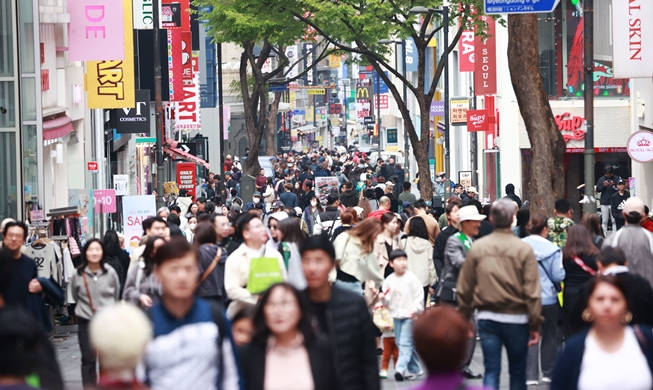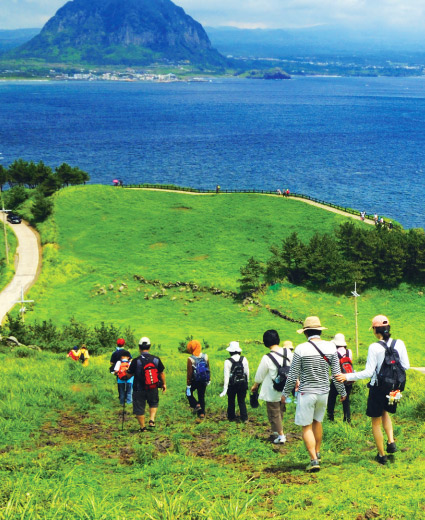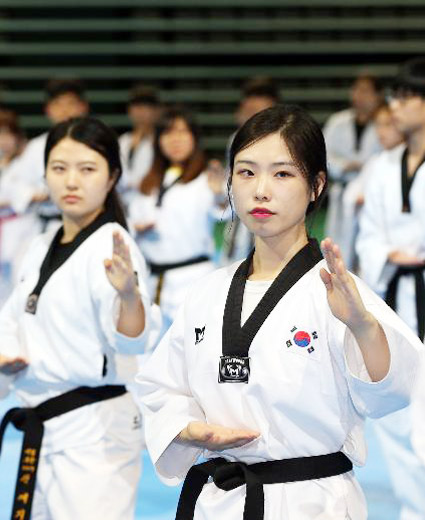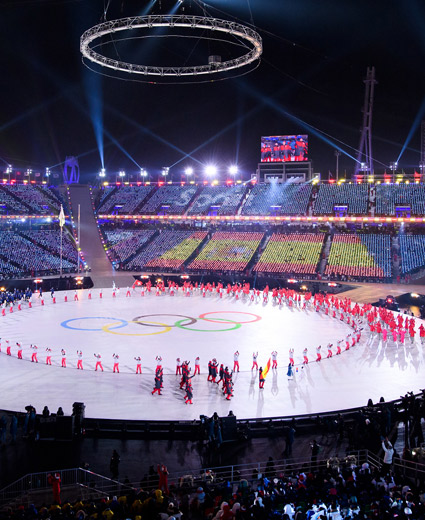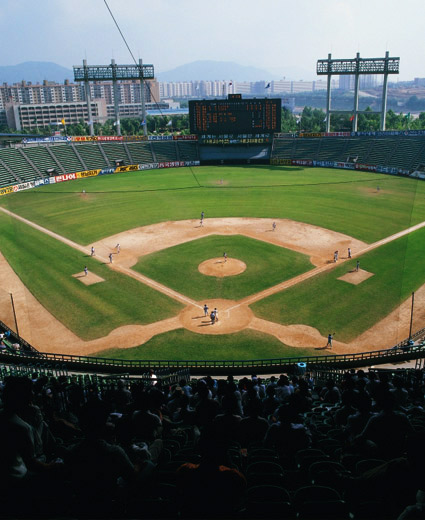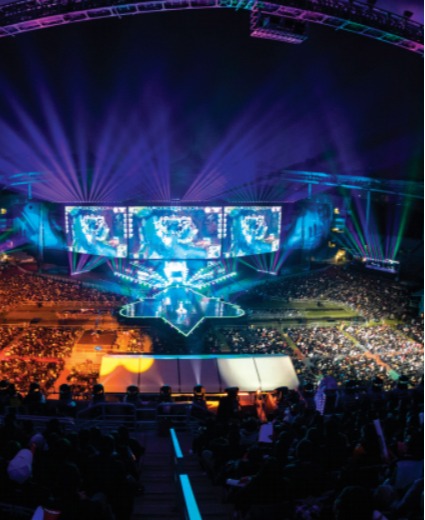-
 Korea.net's 24-hour YouTube channel
Korea.net's 24-hour YouTube channel- NEWS FOCUS
- ABOUT KOREA
- EVENTS
- RESOURCES
- GOVERNMENT
- ABOUT US
1988 Seoul Summer Olympics (Games of the XXIV Olympiad)
The 1988 Summer Olympics, officially known as the Games of the XXIV Olympiad, were held in Seoul in 1988, marking a record number of athletes ever: 13,304 athletes from 160 countries. With the slogan: “Harmony and Progress,” the organizing committee set up the following objectives: participation of the largest number of athletes, worldwide harmony, best results, safety, and cost saving. South Korea became the 16th country (and only the 2nd in Asia) to host the Summer Olympic Games. The competitions were held in 23 formal disciplines and 2 demonstration sports. South Korea ranked 4th overall, winning 12 gold medals, 10 silver medals, and 11 bronze medals
The 1988 Seoul Summer Olympics were very significant in that they served as a venue for reconciliation between the Western and Eastern Blocs, after the Western Bloc’s boycotting of the 1980 Moscow Summer Olympics (Games of the XXII Olympiad) and the Eastern Bloc’s retaliatory boycotting of the 1984 Los Angeles Summer Olympics (Games of the XXIII Olympiad). The event in Seoul transcended ideological conflict and racial discrimination pursuant to the Olympic Charter, and served as an occasion for publicizing the status of the country’s economic development and traditional culture, and the potential of Koreans worldwide.
2002 FIFA World Cup Korea/Japan (17th FIFA World Cup)
Held for 31 days (May 31 to June 30), the 2002 FIFA World Cup Korea/Japan (17th FIFA World Cup) was the first World Cup to be jointly hosted by two countries. It was also the first World Cup Tournament to be held outside Europe and the Americas. The event produced a series of unexpected results. In particular, South Korea astonished the whole world by achieving remarkable success, namely, by reaching the semi-finals. Also, the enthusiastic cheering of soccer fans in red T shirts, called the Red Devils, also served as an opportunity to promote another aspect of South Korea to people around the world. This led to massive crowds to gather for street cheering nationwide. Tens of thousands of fans fervently cheering on their team in the dead of night created quite a sight. During the South Korean team’s match against Germany for 4th place, a total of 6.5 million people filled the streets nationwide to cheer on their national team.
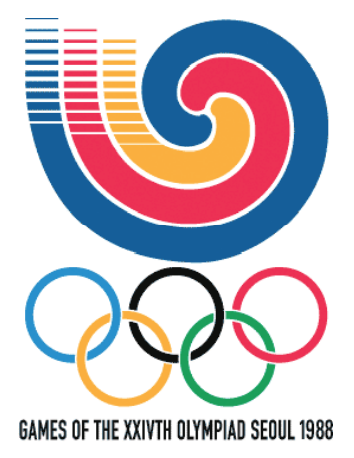
Emblem of the 1988 Summer Olympics (Games of the XXIV Olympiad)
The emblem was designed based on the triple taegeuk, a traditional pattern handed down among Koreans for many generations. The pattern has been widely used in entrances to private houses and handicrafts. It was used to symbolize a wish for the promotion of peace through the Olympics.
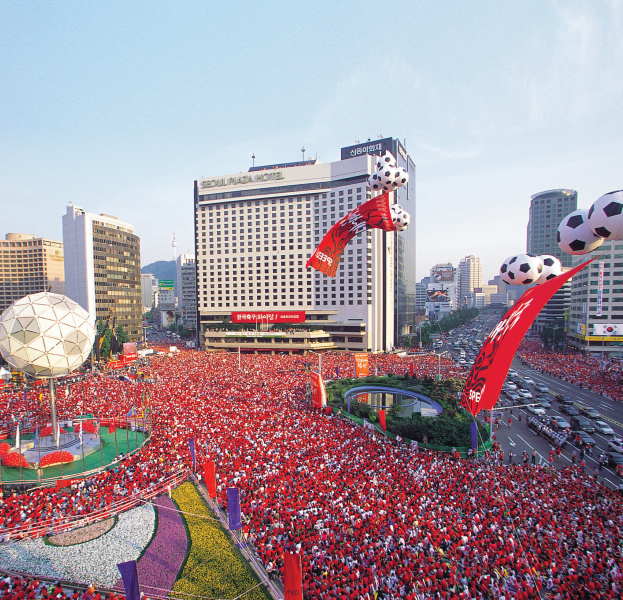
South Koreans supporting the national team in front of Seoul City Hall during the 2002 FIFA World Cup Korea/Japan (17th FIFA World Cup). Many foreigners said that they were deeply impressed by the fans’ enthusiasm and unity. Still, the Red Devils continue to cheer for the national team in major tournaments.
2011 World Championships in Athletics
The 13th IAAF World Championships in Athletics was held in Daegu, the country’s third largest city, from August 27 to September 4, 2011. Located in Daegu, an international city that modern technology merges into history, Daegu Stadium, also known as the Blue Arc, is a sports stadium where big international sports events were successfully held, such as the 2002 FIFA World Cup Korea/Japan (17th FIFA World Cup in 2002) and the 2003 Summer Universiade. It has presented vivid impressions of track and field events to the fans around the world through highdefinition electronic scoreboards combined with cutting-edge ICT technology.
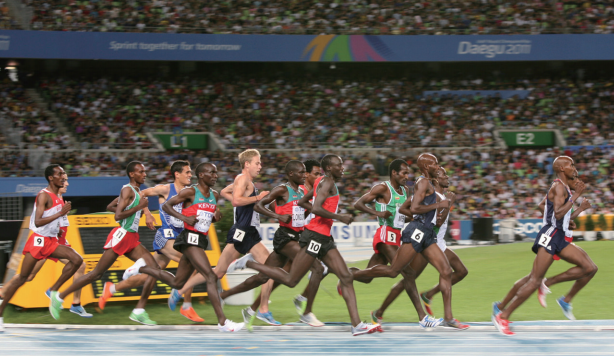
Competitors in the steeplechase at the 2011 IAAF World Athletics Championships in Daegu.
2015 Summer Universiade
The 2015 Summer Universiade was held in the city of Gwangju from July 3 to 14, 2015. It was the third Universiade that South Korea hosted following the 1997 Winter Universiade held in Muju and the 2003 Summer Universiade in Daegu. A total of 17,036 athletes from 143 countries participated in 21 sports.
2018 PyeongChang Winter Olympics
Held from February 9 to 25, 2018, the 2018 Winter Olympics, commonly known as PyeongChang 2018, achieved new records in the history of winter sports. A total of 2,920 athletes from 92 countries participated in this international winter multi-sport event, the largest ever. Among the participating countries were six countries taking part in the Winter Olympics for the first time: Nigeria, Eritrea, Malaysia, Singapore, Ecuador, and Kosovo. This in turn expanded the base of winter sports. The excellent ice quality led to three world records and 25 Olympic records, and 1.08 million tickets were sold, making a big hit.
The 2018 Winter Olympic Games in Pyeongchang was filled with firsts. In other words, it showed the world’s first 5G technology, virtual reality (VR), highspeed video streaming, and autonomous driving and CNN reported that the PyeongChang Olympics was “the most high-tech Olympics ever” thanks to 5G technologies.
Above all, the Pyeongchang Winter Olympics was buried into the minds of people around the world as a legacy of peace and reconciliation for the world, embodying the values and spirit of the Olympics the best. In particular, North Korea sent its largest number of participants: 22 athletes, a cheer squad with 229 women, and 27 senior officials. In addition, athletes from North Korea and South Korea marched under a united flag at the opening ceremony, and a unified team of the two Koreas competed under the title “Korea” for the first time in Olympic history.
This Olympics ran 1,800 programs, including programs that combined Hallyu with traditional Korean culture, also representing a model of the cultural Olympics.
South Korea ranked 7th with five gold, eight silver, and four bronze medals. In addition to ice sports, medals were won in other sports such as skeleton, bobsleigh, and curling, thereby diversifying its winter sports portfolio. At the Paralympics, South Korea placed 16th with a gold medal in the men’s 7.5-km sitting cross-country skiing event.
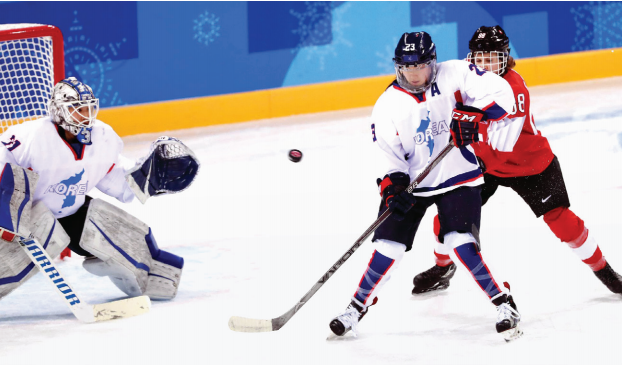
Joint inter-Korean women’s ice hockey team
Korea’s unified women’s ice hockey team at the 2018 PyeongChang Winter Olympics.
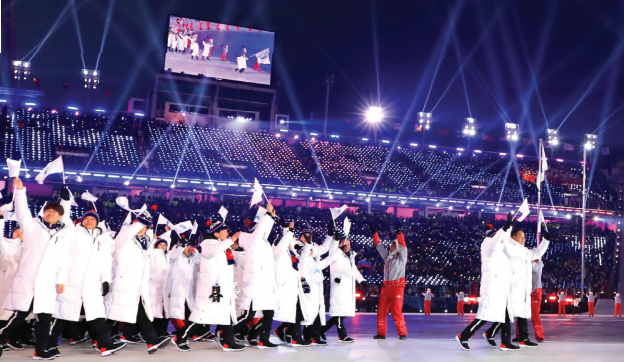
South and North Korean athletes jointly enter the opening ceremony of the 2018 PyeongChang Winter Olympics.
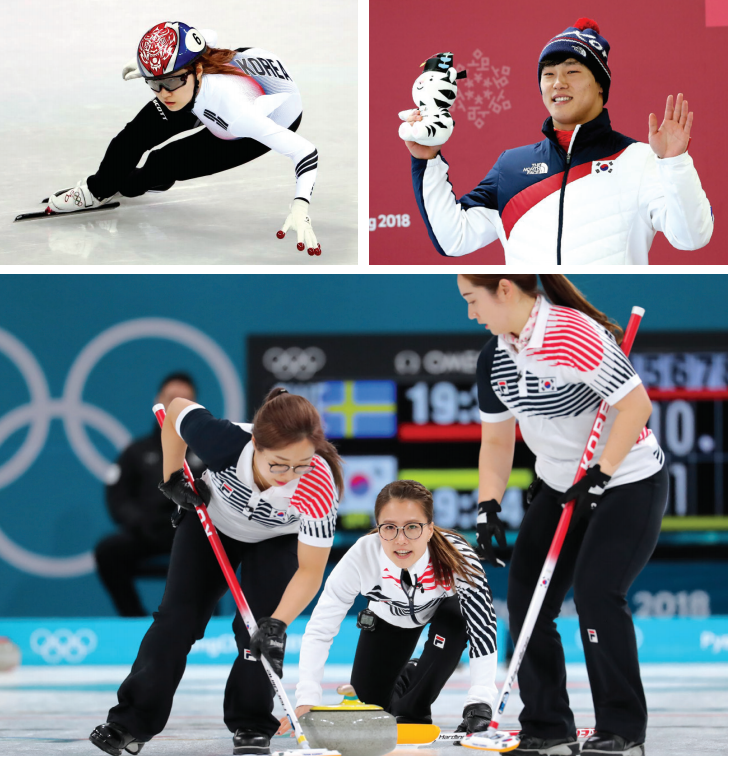
South Korean Medalists in the 2018 PyeongChang Winter Olympics
Choi Min-jeong (Short track speed skating)
Choi Min-jeong took two gold medals with dominating races in the women’s 1,500 m and 3,000 m relays although getting disqualified from the 500 m race.
Yun Sung-bin (Skeleton racing)
Yun Sung-bin became skeleton’s new king at the 2018 PyeongChang Winter Olympics as he won a gold medal marking the largest victory margin in Olympic skeleton history, and the largest margin in any Olympic sliding competition since 1972.
Women’s curling
The five-member team of Kim Eun-jung, Kim Kyeong-ae, Kim Seon-yeong, Kim Yeong-mi, and Kim Cho-hi received international attention with their stunning performance. The so-called Team Kim advanced to the finals after beating traditionally strong teams and claimed a silver medal after losing to Sweden.




